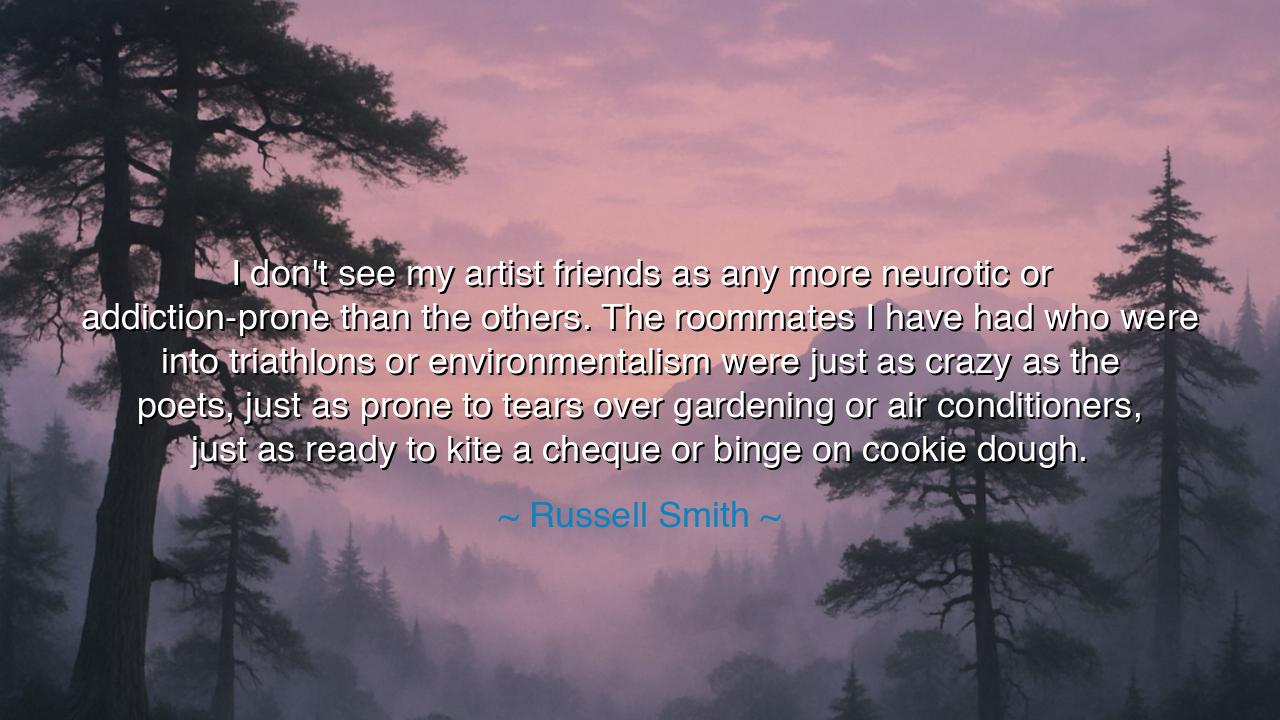
I don't see my artist friends as any more neurotic or
I don't see my artist friends as any more neurotic or addiction-prone than the others. The roommates I have had who were into triathlons or environmentalism were just as crazy as the poets, just as prone to tears over gardening or air conditioners, just as ready to kite a cheque or binge on cookie dough.






The words “I don’t see my artist friends as any more neurotic or addiction-prone than the others. The roommates I have had who were into triathlons or environmentalism were just as crazy as the poets, just as prone to tears over gardening or air conditioners, just as ready to kite a cheque or binge on cookie dough.” were spoken by Russell Smith, the Canadian novelist and essayist, whose sharp wit often cloaks a deeper understanding of the human condition. Beneath his humor lies a profound recognition — that madness, fragility, and longing are not the property of artists alone, but the shared inheritance of all humanity. His words are a defense of the creative soul, but also a reflection on the hidden complexities that dwell in every heart, no matter its outward pursuit.
When Smith declares that his artist friends are no more neurotic than others, he strikes at a timeless myth — the belief that creativity is born only from suffering or that artists alone dwell on the brink of chaos. He challenges the notion that sensitivity or excess belongs exclusively to the painter or poet. Instead, he shows that passion, contradiction, and fragility are woven into the very fabric of being human. Whether a person trains for marathons, saves forests, writes poetry, or plants gardens, the same tremors of emotion run beneath their work — the yearning to matter, to create, to connect, and to find meaning in the chaos of life.
His words remind us that every human being, however rational or disciplined, is touched by the storm of emotion that defines existence. The athlete, straining against his limits, weeps when he fails to improve his time. The environmentalist, filled with righteous conviction, despairs when the forest falls. The ordinary worker, after a long day of monotony, may collapse into small indulgences — a night of overeating, a forgotten bill, a rash act of rebellion. In this, Smith recognizes a great equality: that we all share the same restless fire that can both drive us to greatness and undo us with its intensity. To live deeply is to live near the edge — and in this, the poet and the triathlete are kin.
History offers countless examples of this truth. Consider Vincent van Gogh, the archetype of the “mad artist,” tormented by his vision. Yet contrast him with Robert Scott, the explorer who led his men across the Antarctic ice — a man of science, not art, yet no less consumed by obsession, no less haunted by the fragile line between glory and despair. Both were human beings burning with the same unquenchable desire: to touch the infinite through their own finite hands. The difference was not in the soul, but in the path they took toward meaning. Smith’s insight reminds us that the human spirit is not divided by profession, but united by its capacity to feel too much.
In describing even the small absurdities — tears over gardening or air conditioners, binges on cookie dough, or the reckless floating of a cheque — Smith unveils the tender comedy of human imperfection. These moments, though trivial, are symbols of the same vast hunger that drives all art and ambition: the hunger to soothe the ache of being alive. It is in these contradictions — the noble and the ridiculous, the serious and the sentimental — that the beauty of life is revealed. To be human, he suggests, is to oscillate between grandeur and foolishness, between soaring ideals and soft indulgences.
His humor carries a moral clarity: it humbles the proud and softens the cynical. For those who look upon others with judgment — calling one “crazy,” another “obsessive,” another “weak” — Smith’s reflection offers a mirror. It reminds us that no one escapes the frailty of being human. Our eccentricities are not flaws to be mocked, but expressions of our shared vulnerability, our attempt to find balance between discipline and desire, reason and emotion. The artist does not own passion; the activist does not own virtue. All hearts tremble alike.
The lesson, then, is one of compassion and understanding. Do not divide people by their callings or mock their peculiarities, for the same forces that move them dwell within you. The poet’s tears and the athlete’s discipline spring from the same source — the will to live meaningfully, to make sense of the mystery of existence.
Practical actions: When you see someone acting strangely or passionately — crying over a broken machine, obsessing over a race, or creating something no one asked for — pause before you judge. See in them a reflection of your own humanity. Allow yourself to feel deeply, to care absurdly, to laugh at your contradictions. For as Russell Smith reminds us, the boundary between madness and meaning, between the artist and the ordinary soul, is not a wall but a mirror — and in that reflection, we are all the same.






AAdministratorAdministrator
Welcome, honored guests. Please leave a comment, we will respond soon